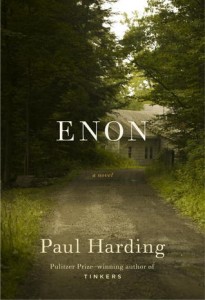 I picked up Enon by Paul Harding on a rare trip to the bookstore in the first few weeks of my son’s life. I did not know then what the book was about, but I had so enjoyed Tinkers that I was glad to take a chance on what I knew would be a solidly written piece of fiction. I did not know that it was going to make me question how emotion is and should be conveyed in literature.
I picked up Enon by Paul Harding on a rare trip to the bookstore in the first few weeks of my son’s life. I did not know then what the book was about, but I had so enjoyed Tinkers that I was glad to take a chance on what I knew would be a solidly written piece of fiction. I did not know that it was going to make me question how emotion is and should be conveyed in literature.
The Structure of Loss
Three sentences into reading Enon, we already know that Charlie Crosby has lost his only child, thirteen-year-old Kate. Killed while riding her bicycle, we’re quickly immersed in the downward spiral of Charlie’s grief as he pushes away his wife and begins to lose himself.
The book is very well structured. Harding weaves together the progression of time with flashbacks from Charlie’s life, insights into the history of the town of Enon, and ever more intimate looks at Charlie’s guilt—both the destruction he’s currently wreaking on himself and flashes of how he might have prevented Kate’s accident—so that with each page the reader is drawn deeper into Charlie’s world and the experience of losing a child.
Intellectualizing Grief
There is only one thing missing from Enon—emotional connection. You’d think with a first person narrative and a subject as wrought as the death of a child that it would be easy to connect with Charlie. As a new mother who basically worries every second that something will happen to my child, I was actually terrified to read beyond the first page of this book because I thought I’d be devastated by it.
Instead, because our experience of the events relies entirely on Charlie and Charlie wants nothing more than to escape the pain of grief, I felt distant and cold while reading this book. I could intellectually engage with the horrors of losing a child, I could conceive of how the path Charlie was on could ruin his life even further, but I could not feel much of anything about any of it. Which turned out to be a disappointment and my mind wandered a lot as I read the book.
Imparting Emotion in Narrative
So how was it that Harding failed to create an emotional connection between the reader and Charlie? The last thing Charlie wants to do is feel the loss of his daughter. Pulling back from that kind of horror is a natural human coping mechanism, but by running us through every thought in Charlie’s head, we don’t get to make jumps, leaps, and emotions on our own. It becomes difficult to engage with Charlie and the situation. And when Charlie is describing the feeling of loss, it’s still difficult to connect because we see what Kate’s death is doing to him, but he wants to self destruct and provides no entree into reaching out to him. It feels as though Harding is pushing us away as much as Charlie pushes away his wife.
Could it be any other way?
If Harding wanted us as readers to empathize with Charlie on an emotional level, he could have interspersed third person perspective. If we witnessed Kate’s death without the filter of Charlie’s distance, it would be impossible not to feel his pain. We would travel down that emotional spiral with him and his actions seem inevitable. It would be harder to judge him and wish he would make different choices. If we saw how neighbors saw him—again without the filter of Charlie’s rationalizing—we might pity the poor wretch he becomes.
Should it be any other way?
I don’t know. I was horrified by how dead inside I felt while reading this book, but I’m not sure complete emotional devastation would have been the best tack either. I would have preferred a blend of emotional and intellectual appeal. In fact that pulling between our two ways of dealing with life could make for an unequaled depth of engagement.
As a writer, I’d find trying to create that perfect balance between the two a wonderful challenge. Although I know it would not be easy. In fact it’s something I struggled with in writing Polska, 1994 which in early drafts came off as a lament which also kept the reader at a distance—if only because it veered too far in the direction of emotion. And this balance between reason and feeling is something I’d urge you to think carefully about in your own writing—at least in the editing stage.
Harding is a gifted writer and I can only imagine he created the exact level of emotional engagement he wanted. Which only leaves me to wonder—why show me so much of Charlie’s devastation while holding my heart so far away from him?
If you want to unpack Harding’s use of emotion or just see if I’m a cold fish of a reader, pick up a copy of Enon from Bookshop.org. Your purchase keeps indie booksellers in business and I receive a commission.





Leave a Reply